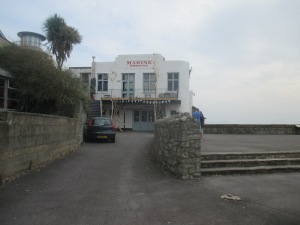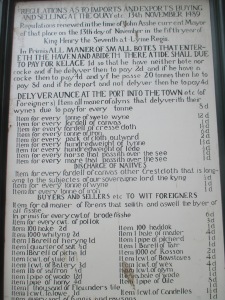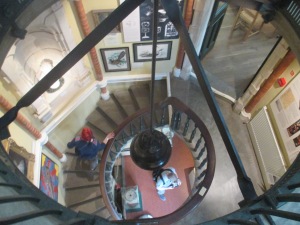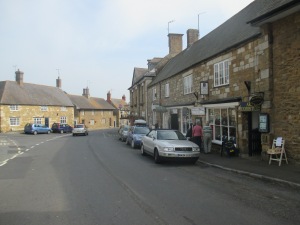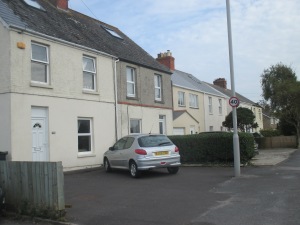‘Do you want a chocolate bar?’ – weird conversation, weird men, weird pub, Weymouth.
It’s around 8.30 on a drizzly weekday morning. I zip open the thin coversheet and poke my head around to see where exactly I’ve landed. It’s the edge of a small chalet park on the edge of Lyme Regis. My tent’s at the edge of this park and beneath Lyme’s fossil-rich cliffs, and just about concealed from the confused eyes of retired pensioners by a series of fortunately-placed bushes. The weather’s damp and grey, matching my mood, hungover, a little worn out, but these September mornings are deceptive, threatening hell in the morning then brightening up by the afternoon.
I exit quickly, still undetected, and head down towards the sea. There’s a wide expanse of white and grey rocks that reflect the mood of the skies. A murky tide laps against them. Look hard enough, and you can find the remains of ammonites up to 200 million years old along this beach. Much of the coastline is older than ancient, some of it unchanged since the early Jurassic time, when a warm sea covered most of the British islands and massive ichthyosaurus and pliosaurus stalked the ocean. The name of this beach is Monmouth, after the Duke who landed here in 1685 and attempted to seize the throne from his estranged uncle, James II. Like almost every revolt preceding it from the rebellious, mysterious South West, the uprising was a total failure. Twelve of his supporters were hung on this beach, whilst it took eight blows of the axe to separate Monmouth’s head from his neck back in London. The beach is deserted. I look out to the placid sea, to the cliffs and fossils to my right, and the Cobb and Lyme to my left.
There’s a couple of people walking their dogs on this quiet and grey little beach. I wonder about the remains of the human race that might be discovered by chance and speculated over by future species, be they preserved in mud, or water, or some other unusual landscape feature. Each generations fears for its own Armageddon. What dogs me more is our inevitable obsolescence and disappearance. What will remain of humanity, what will be left behind? Our concrete structures and plastics, our oil spills and rusted fridges, our artificial islands of refuse in the sea, and Carl Sagan’s record collection? It’s a solemn enough space to peer into the void of one’s own death, there among the stones which have outlived and seen out generations of human lives, some with ideas and passions like mine, others animated by ideas, habits and rules as mysterious as the dreams of a swordfish. ‘I believe that when I die I shall rot, and nothing of my ego will survive’, Bertrand Russell once wrote, with a smarting and disarming honesty. I envision the inevitable decline of my faculties, the fossilisation of my habits, my eventual disappearance like those of everyone I know around me, traces of our existence remaining on some frozen web domain.
The cliffs are collapsing into the sea, 200 million years old here, 260 million years old by Exmouth. The entire area’s a world heritage site, and as I leave Monmouth beach I pass tourists clustered in a number of seaside cafes, sipping cream teas and nibbling bacon butties. There’s more fudge on sale, stuff that no-one wants to eat, but which we all must buy. Hikers bulk-buy sandwiches. I get some half-price cereal bars at the Co-op, a bag of granola at Tesco, and head down towards Lyme’s museum. Near the Marine Theatre, a group dressed in Regency garb wander along the sea-front, a party of Americans just arrived from Bath. They are surprisingly sober and humourless, perhaps attempting even the emotional cladding of that period, and look out onto the windy bay.
The town’s museum is large and superb, and filled with interesting stories. Most trace the story of Mary Anning and her shop filled with fossils, and the growth of fossil-collecting on the ‘Jurassic Coast’. The town has thrived since early modern times, aided by its unusual Cobb harbour, which for much of its history was detached in a complex feat of early engineering. Leland visited here in the 1530s or 40s, and found it to be a ‘praty market town set in the rootes of an high rokky hill down to the hard shore’, with ‘good shippes … fishing and merchauntice’. During the 18th century the port declined and it took new life as a resort, where the wealthy came to enjoy the new fashion for sea-bathing. Striped sheds were pulled by horses into the water, bathers would change into a special bathing outfit inside them, then an attendant would oversee their medicinal immersions into the water. It all sounds mildly traumatic. Whistler, Beatrix Potter and Jane Austen all have connections with this genteel seaside resort, and Tolkien and Tennyson once holidayed in a hotel which is now a derelict shell.
I leave Lyme by way of a brutal big hill, and then take a dull as dishwater eight mile ride up to Bridport along long and busy country lanes, picking up pace and terror as it joins the main A-road as I compete for space with articulated lorries. This is particularly tough up the many hills I travel up, and rarely it seems down: those W-shaped things. There’s the wind too to contend with, right in my face for a third day now. The wind could blow in any number of directions, but so often it is against me! I shout at it and curse it, urge it to bring its best, but a kind of fatigue is kicking in. Both wheels are now buckled, that’s clear. Unlike other bike tourers, I’m doing less miles per day now than when I started. I’m heading home, but I’m drawing on my last reserves. The hills increase in frequency after Bridport, at first a kind of continual ripple that then approaches the peaks and troughs of a seismograph.
I take a stop at Burton Bradstock, where there’s a lovely sandy beach owned by the National Trust. For the first time on my trip, it’s sunny and warm enough to chance a dip in the sea. I can’t resist, particularly after reading about the benefits of sea bathing in Lyme. Though I have no horse-drawn shed contraption, I undress and reveal to the world my ridiculous tan lines. The sea is cool but pleasant, and I swim around in the waters, delighted, tasting the salt on my tongue, splashing around, gazing back at the distant land, the layered sandy cliffs, and the fishermen catching nothing with a certain oceanic meditative joy.
It’s turning into a fine day. I’m a little parched, and with a steep hill ahead of me, I stop at the Black Bull pub in Swyre. I head to the bar, and ask politely for some tap water. The landlady refuses. ‘I’ll have to charge you for it, I have to pay for it’. ‘What?’ I’ve asked and received tap water from pubs and cafes all across the country, and I’m genuinely surprised. Is it a dry joke? The old couple at the bar don’t know where to look. ‘I’m sorry…’ she keeps repeating insincerely and meaninglessly. ‘It’s you I feel sorry for’, I reply.
I am irate! (Cue long rant, sorry…) The sign outside offering a ‘friendly welcome’ should be investigated by the advertising standards agency. I’m wary about reading anything into this particular act of miserliness, but I’m feeling that it reflects a kind of behaviour and culture I’m experiencing in the south, and which unfortunately continues over the following days. There’s a general meanness and rudeness I’m encountering in passing conversation, and little chat is worth reproducing here. Broach social or political change of a kind, and the answer I’m hearing is ‘why should I?’ People looking out for themselves. Four by four vehicles are common, but no-one farms. Golf clubs everywhere.
There are no power stations here, no pylons or turbines, no factories, few farms. The people won’t allow them here, and their elected representatives ensure that the voice of the shires trumps the needs of the urban communities of the north, Wales, Scotland, even, to be fair, Devon and Cornwall, which feel different and not part of this fug that begins around Dorset and just gets worse. Consider south Wales or south Yorkshire, the chimneys and ex-industrial valleys, the soaring unemployment. Would your average Conservative voter in Surrey or Dorset take their share of the country’s needs and allow for a new power station, or factory, or wind farm, or small town to be developed in their locality? Yeah right. They take without giving, blame without helping. Even the roadside veg stalls are tooled with CCTV security cameras. They say nothing about theft, and more about a mean paranoia and a depressing nimbyism. Welcome to the South.
Why should I? Union jacks flutter on the front patios. Suburban semis, villages with cottages, houses with huge front gardens where little grows except the odd over-manicured rose, or a festering array of plastic gnomes or toads, and a little plaque by the mock-gabled window saying ‘rose cottage’, ‘oak house’, ‘ivy ridge’ or some shite. This is middle England, muddled England, where a middle culture of middle-class, middle-age, middle lane, middle mass, middle everything man and his deferential wife prosper in these brackish waters. Jeremy Clarkson and Liz Jones provide them with thoughts. Dressed in the same clothes and tattoos as everyone else, they drive in oversized cars to the out-of-town retail parks for a Saturday or Sunday afternoon out, poking around Waitrose, buying golf clubs from Sports Direct. Many are from what Michael Collins called yesterday a ‘working class diaspora’, but all will agree with John Prescott that ‘we’re all middle-class now’. They are not the majority, but believe themselves so and have politically become so in their support for the Conservative Party. Selsdon Man, Bluewater Woman. Absolutely maddening to talk with.
Talk to them in the chain pub, if they’ll deign to give you the time of day, and you’ll find that their political opinions are spoken from a pre-recorded script, an unthinking amalgamation of Daily Mail and Express headlines. They’ll tell you that they support their local independent shops, that they buy organic or British. Ask them about the political changes they’d like to see. They’ll claim that they ‘don’t do politics’, but then will vomit up some bilious and mean comments about people coming over to scrounge on an over-generous welfare and healthcare system, about the Scots/Welsh/whoever being too ignorant of the economy to manage their own affairs, of the out of control crime rate, of the decline of community. Highly politicised opinions, the kind that return Conservative governments.
This rump, largely but not exclusively in the south and middle of the country, calls itself the ‘moral majority’ when it’s in the mood. Its beliefs and world-view is entirely out of sync with what social research or analysis of political events would suggest, but then they’re so hostile to new ideas, or any kind of new experience that might penetrate the privet hedges and cavity walls of their minds, that their eyes glaze over immediately when some kind of alternative is suggested. In their middle positions, many self-employed or working in parasitic industries like property, corporate law, finance, insurance, they’ve overseen without thought the effective privatisation of the UK, from a country with a slightly socialist, strong public government with high streets, communities and cooperation to a dispersed and uncentred desert of retail parks, motorways, security devices and privatised prisons, hospitals, police forces and governments. They don’t care, because compassion would require some kind of strong feeling.
Two days back,Colin described the people around him as ‘dead’, referring to their close-mindedness, meanness and lack of curiosity. I felt that he was being unfair, over-dramatic, perhaps deliberately spiky for some humourous effect. But as I travel further back home and have increasingly fruitless conversations, I begin to get what he means. And I don’t know what to make of it, except to defer back to my belief in the future. The future lies with the young, still unformed, still open and receptive to new ways of living.
Undulating hills continue until I reach the edge of Weymouth. I’m meeting my sister here for a few days exploring some of the Channel Islands together. I can’t wait! Last night I realised that I’d messed up our travel plans, and so we’re meeting in Weymouth tonight rather than Poole. Staying with my sister has forced me to think about the ways I’ve been living. She rightly asks me on the phone, ‘where do you go to the toilet?’ And reader, I’ve chosen to spare you much of the trials and tribulations of wild toileting, experiences I’d sooner forget myself.
And showering? She’s shocked that I now rarely brush my teeth more than once every two days. Other backpackers I’ve met have often had yellowed or decayed front teeth, something I’d observed but not thought much about until this evening, as I ride, and think about my sister, and my tongue rolls over my slightly pained molars and back teeth. A visit to the dentist is overdue.
And eating? Tortilla wraps with kidney beans every day! Come on, this isn’t fit for someone else, so why do I tolerate it? Well, it’s not entirely out of preference. It’s the cheapest way to live. But with someone else accompanying me, my means of operation do seem like a kind of cheeky, maladjusted vagrancy.
There’s a camp site two miles out from Weymouth in the adjoining suburb of Wyke Regis. Since reaching Chickerell there’s been a gruel-grey gloop of low-rise, detached bungalows that form a stretch of suburbia. It doesn’t thicken further in, just continues at the same rhythm as I follow the rising hill up towards Wyke. It reminds me of south Essex, of the suburbia around Newcastle or Birmingham, the same uniform 1920s red-brick style, with an over-emphasis on privacy, protection and distance, on sameness with one’s neighbours yet individual distinctions of that generic kind I’ve seen on this journey, the four by four, the personalised house name, the rose bush, the bird house, the large forbidding gate.
I reach the camp site down a long side road, a pleasant enough caravan park called Pebble Bank, opposite a derelict army training camp, rusty razor wire and Anderson shelters with smashed windows. It’s £15 a night, which split between two isn’t so bad. There’s a large and mostly empty field overlooking Chesil Beach and Portland, a small and almost separate island just south that is surprisingly urbanised. Its large harbour is apparent from the distance. After wild-camping for free in some of the most beautiful locations, I’m not sure how £15 covers a small pitch on an empty field but so it goes, and I pitch up and head out towards Weymouth.
Wyke road is long and dull, a steep rise then drop into the large harbour at Weymouth. There’s a couple of retail barns on the other side, but the town itself largely retains the character of a Georgian-cum-Victorian seaside resort. Its long esplanade and twee shelters look pretty against the backdrop of the light-tan sands and an unoccupied beach. A long row of Victorian townhouses stand along the prom, bay windows and tall staircases jutting out. There are countless fish and chips and amusement businesses, most of whose insignia has not been updated since the Eighties.
Is it tacky, or depressing? We easily associate these things with the always-fading British seaside resort, sometimes unfairly, I think. It’s possibly both, depending on your mood, or neither, if you look closer, pass by the pubs along the harbour, down old St. Mary street with its predictable array of high street stores alongside those seaside features that you spy with a roving eye and smile, the dedicatory clocktower, the custom house and old fishmarket, the sailors’ pubs, the old chapels, or Albion House where Coffee One is based, the chain big in Cardiff where I meet my sister Lucy, at least an hour late than arranged. I am now always late, for what is time, but the time to get from one place to another? It must be bloody annoying waiting…
We wander along the old esplanade, by the harbour, with plenty to catch up on. We find the plaque that marks Melcombe Regis, now part of Weymouth but once considered a separate town north of the harbour. Here is where the Black Death of 1348 probably arrived into the British mainland, eventually killing between 30% and 50% of the population. All kinds of bizarre energies and treatments were released by the outbreak. In Europe, bands of flagellants would rove from town to town, whipping themselves whilst continually singing, and claiming to receive instructions from angels. Much of the clergy were killed, and for a time the religious and social bonds restricting medieval peasants were loosened.
We wander round to the south side of the harbour over a small bridge, passing Bennett’s fish and chip shop where we share a delicious if overpriced portion of chips. This chippie was involved in a local chef’s campaign to sell sustainable fish, and makes a great show of its sale of mackerel, though punters still queue up and pop in for overpriced haddock and cod. Some habits can be inherited without thinking, and as consumers the British often struggle to taste the difference between battered fish. A recent food survey found that up to a third of fish in Glasgow were mis-labelled, and the problem’s thought to be only a little less severe elsewhere. As a fried potato connoisseur, I’ve seen the price rise and quality fall as I’ve proceeded south, but at least this bucks one trend. Gulls stand and shriek by our feet, menacingly goading us to surrender a chip, but we refuse, and their hunger leads two to start pulling apart a fish net whilst they wail at each other.
The harbour side is lively, and we watch one fisherman struggle to keep hold of a crab he’s caught, which keeps wandering away from him. Fresh fish is being sold at the back of a nearby van, almost straight off the boat. It doesn’t get much fresher than that. Following a tip from a young woman at the campsite, I suggest we have a cocktail by the harbour, and we sit by the Rendezvous bar. The local girl behind the bar tells me about the town’s drinking problem as she serves me a cheap cosmopolitan and a very strong zombie. This bar remains open til around 5am on week-nights, and the other bars on the seafront will remain open til 7am. Fortunately, she thinks, they no longer serve drinks in glasses after 7pm, thus reducing some of the harm of inevitably boozed fisticuffs. Local army and navy men fill the drinking ranks alongside fishermen and sailors. The cocktails are strong but nice, and outside we catch up with the harbour beside us.
Evening sets in. We wander round the small town a little more, then spy a Wetherspoons with a couple of plugs to charge our phones. The place is packed with middle-aged couples eating cheap chicken dinners, mostly in silence, the plain timber walls with their neglected photographs of Weymouth past and brown carpets reflecting the mood of the place. At the bar, two local older men are attempting to flirt with the young barmaid but they’re too drunk to articulate anything resembling the sensible. ‘What’s that chocolate bar?’ ‘Kinder Bueno’, she volunteers, a little confused. ‘Boyno, right. Do you want a chocolate bar?’, they keep repeating. They gesture to me, waiting for a drink then being served, and hint that the question would have more success if I asked it.
But nothing is making sense here, though the question at least captures something I can’t make sense of, the bored and heavy drinking, the condescending treatment of younger people by older, the paltry choice of low-skilled, low-paid jobs that are the future for young workers on these islands, and the relatively casual sexism, racism and hypocrisy that one will often chance open, as I have increasingly so in the south. The bar-staff and people I meet in Weymouth tend to be from the town, are relatively happy with it, and I gather from quick conversations here and there, in the shops and pubs we pass through, that life in the town is fine enough, but not that exciting. Dead in the winter, I’m told, dependent on tourism, as many of them are.
We head out, and walk back up the hill to Wyke road, a long trek that seems to never end, til we reach our dark and quiet caravan park and settle in. There’s a chance to have a shower, brush your teeth, life’s little luxuries. We both top and tail inside the one-man tent, which proves surprisingly spacious and capacious, and get a good night’s rest.














